Message from the Director
Another year has begun and is already well underway. Our staff have hit the ground running. We are looking forward to a very positive year for our research, postgraduate teaching programs, and community engagement with health services and their workforce groups. Flinders University has been going through a significant period of change in its systems, and 2018 will see many of these processes settle into their new rhythm.
We have started the year with strong and increasing enrolments into our postgraduate Chronic Condition Management and Cognitive Behaviour Therapy programs, which likely reflects the reforms in the healthcare community and the growing need for a more evidence-based focus on these skills. Likewise, our professional development opportunities continue to be taken up by health services; particularly, growing demand for motivational interviewing skills, as self-management support increasingly becomes the norm for healthcare services.
We have several PhD candidates (including 3 of our own early career researchers) on track to make excellent progress with research on a range of topics this year, including paediatric chronic condition management, physical health and mental health, gambling, and emergency services first responder experiences, just to name a few.
In this issue, you’ll be able to read about some of these activities and more also on the progress of our existing programs and some new research too. I hope you enjoy reading these and find them of use to your own work. Wishing you all a great year and thanks for your ongoing support and collaboration.
Professor Sharon Lawn
Director FHBHRU
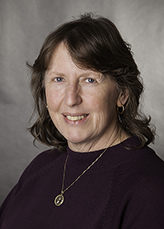
Improving Cardiovascular Health and Quality of Life in people with Severe Mental Illness: A randomised trial of a ‘Partners In Health’ intervention
They say that translation to practice takes about 20 years. In 2001, we undertook a pilot study of the Flinders Program with a population of people in the community with severe mental illness as part of the original Chronic Disease state demonstration project in SA. That study was the first to apply chronic condition self-management to that population, internationally and , since then, a number of studies have followed. In 2017 we commenced an NHMRC-funded project that aims to test a comprehensive chronic condition management approach to reducing cardiovascular risk in patients with severe mental illness. The project is set to finish in 2020.
Alarming as it is that people with severe mental illness (schizophrenia, schizoaffective disorder, bipolar disorder, depressive psychosis) have 13-30 fewer years of life expectancy than the rest of the population, of even greater concern is that this gap is widening. Most deaths in this group are from chronic physical illnesses especially cardiovascular disease. Guidelines on identifying and managing physical health risk factors are available but poorly implemented. The problem lies at the disjuncture between mental and physical illness. Mental health services do not routinely focus on the physical health of their patients, partly because they do not have clinical systems to integrate physical and mental health and primary care likewise. Similarly, patients have limited access to services and motivational interventions whose focus is to address physical health in the context of complex psychosocial issues.
In this project, led by Prof Malcolm Battersby in collaboration with Prof Sharon Lawn and leaders in this field from across Australia, we will be conducting a randomised trial in to evaluate the effectiveness and cost-effectiveness of the Flinders Program compared with usual community mental health care. The main outcome measures will be cardiovascular risk and quality of life. Patients will be recruited from the SA state clozapine register and Adelaide-based community mental health clinics, initially in the southern Adelaide region. We will be conducting a detailed qualitative analysis alongside the trial that will aim to identify essential components, enablers and barriers at patient, clinical and organizational levels for national sustained implementation of recommended physical health care delivery to people with severe mental illness.
Professor Sharon Lawn
Director
Flinders Centre for Gambling Research staff member to visit Technische Universität (TU) Dresden, Germany
Last year, Technische Universität (TU) Dresden academic, Professor Katja Beesdo-Baum visited Flinders University seeking to establish contact with Flinders University researchers in the field of mental and comorbid physical health research with a focus on population health methods (i.e., epidemiology – the study of patterns, causes and effects on health within and across populations). Owing to her similar research interest and foci with FCGR, Prof Beesdo-Baum met with Dr Kate Fairweather-Schmidt, a connection that culminated in a successful funding application to International Network on Diabetes and Depression (IN2D) supporting Dr Fairweather-Schmidt to visit Dresden in September 2017. 
The IN2D itself is supported by German Academic Exchange Service (DAAD), which assists academic exchanges between TU Dresden and a number of leading university across the globe, including King’s College London and Flinders University/SAHMRI. IN2D focuses on facilitating collaboration across institutions in order to simultaneously advance cutting-edge research and potentiate cultural understanding.
While at TU Dresden, Dr Fairweather-Schmidt met with a number of leading researchers in the fields of behavioural epidemiology, neuropsychology, OCD and addiction (including other disorders linked to impulse regulation difficulties, such as eating disorders, gambling and bipolar disorder – mania) who FCGR has identified as possible collaborators on dual-site (i.e., Flinders University-TU Dresden) projects.
Dr Kate Fairweather-Schmidt
Research Fellow & NHMRC Clinical Trial Manager

West Java Australia Award Fellowship
We were very fortunate to host a group of mental health advocates from West Java as part of an Australia Award Fellowship, funded by the Department of Foreign Affairs and Trade. The fellowship is part of a collaboration between West Java Psychiatric Hospital and Flinders University mental health academics to build a shared research agenda and commitment to improving mental health care. The Fellowship addresses a significant development challenge for Indonesia – its treatment of people with mental health disability. It will support mental health policy, services and emerging NGO leaders in West Java, Indonesia to address human rights, stigma and improve the provision of care to its 20% of the population who experience mental illness. West Java is Indonesia’s most populous province and has the highest prevalence of mental health problems, including very high rates of Pasung (use of restraint at home). West Java has virtually no formal community mental health services and very few primary health services that provide care to people with mental illness. Combined with limited access to medications, there is much to be done to help support the development of community capacity to address the needs of people with mental illness and their families.
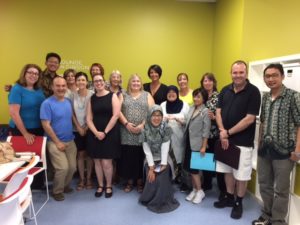
The Fellowship has enabled 4 trailblazers from West Java’s developing mental health non-government organisations to visit like-minded individuals and organisations that are champions for mental health in Australia. Their shared discussions have enabled the fellows to develop skills, knowledge and capabilities to build understanding in this challenging health area. Their 2-week visit has included a packed program, including tailored workshops, mentoring by Australian leading mental health consumer advocates, a visit to the SA Mental Health Commissioner and Community Visitors Scheme, and site visits to numerous SA mental health non-government organisations including the Mental Health Coalition of SA, Skylight and MIND. Together, we have explored translation steps required to establish more effective psychosocial supports for people with mental health issues in West Java, to improve mental health service delivery and reduce Pasung in their communities.
The Fellows included Mr Muhamad (Taufik) Hidayat, a mental health nurse and Research Coordinator, Community Mental Health Department, West Java Psychiatric Hospital, Bandung. Ms Lelly Resna Nugrahawati (Child and Adolescent Psychiatrist) representing Akeswari which is one of the key NGOs working in the mental health area in West Java, particularly for children and adolescents with mental health problems. Ms Isti Chalifati Lazuaria (Social Worker) who helped to found Bipolar Care Indonesia (BCI)- Bandung in 2015 BCI Bandung provides services, prevention-promotion, rehabilitation and aftercare for people with bipolar, and also engages with educational institutions from all levels to increase understanding of bipolar disorder in the community. Mr Gema Gumelar is a psychologist and leader for KPSI -Indonesian Community Care for Schizophrenia. KPSI has 20 branches throughout Indonesia, with one mission to promote mental health, especially for people with schizophrenia and their families throughout lndonesia.
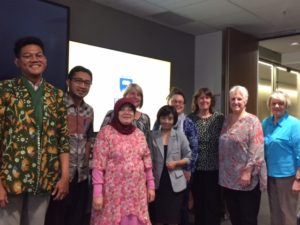
Our next steps are to support the Fellows to translate the goals they have set to improve their mental health support to their communities into practice, and to help them evaluate their progress.
Professor Sharon Lawn
Director
Flinders Aboriginal Gambling Services
What we do
Joint program between the Southern Adelaide Local Health Network and FHBHRU. The program spans from community engagement through to specialised treatment interventions to minimise the harm caused by gambling in Aboriginal communities.
Southern Metro Service; Kat Wanganeen and Ben Riley
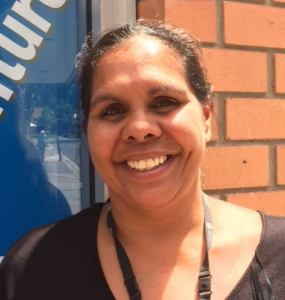
Northern and Western Metro Service; Selina Gollan and Bekh Osborne

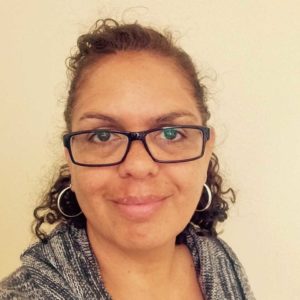
Latest initiatives
We have focused our efforts on engaging with two specific sub-groups:
1) Aboriginal offenders
The rate of problem gambling among Aboriginal prisoners is disproportionately higher than among the rest of the prison population in South Australia (75% compared to 57%). We have established solid links with the Adelaide Pre-Release Centre and the Adelaide Women’s Prison, and hope to expand this to other Correctional facilities over the coming year.
As well as continuing to provide individual therapy sessions to Aboriginal problem gamblers while in prison, and re-engaging with them on their release, we trialed a new group program in the Women’s Prison. Developed by Ben Riley, this program is based on ACT (Acceptance and Commitment Therapy) and was attended by both Aboriginal and non-Aboriginal prisoners. The outcomes were positive, with participants well engaged and prison staff reporting a noticeable improvement in behaviour among those attending the group.
Our team has also been successful in winning a grant from the Department of Correctional Services, to provide develop and trial a Behavioural Activation program for Aboriginal offenders exiting prison. We begin the roll-out of this program in the next month.
2) The Pitjantjatjara community
There are approximately 4,500 speakers of Pitjantjatjara; this continues to be children’s first language and the language used between peers. Around 2500 people remain living in the Anangu Pitjantjatjara Yankunytjatjara Lands, based in the far north-west of South Australia, however there has been a significant diaspora from the Lands to Adelaide and other major regional settings.
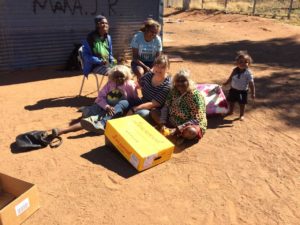
Our team received a small grant from the Prime Minister and Cabinet office to provide service provider training and to conduct community forums on gambling across the Lands. This was a bit of a logistics nightmare, getting the team up there and safely accommodated but we worked hard and made it happen. A total of 140 people from 6 communities engaged in the forums, granting an opportunity for them to speak about their concerns about gambling and sharing ideas on how they would like to move forward. In community, card playing is prevalent, and as much as it maintains the social network it can also be a disruptive force. Outside of community pokies are the main activity, and heavy playing can leave people stranded, without cash, away from their usual support base. 4G is on its way to these communities, heralding a new era of access to internet forms of gambling.
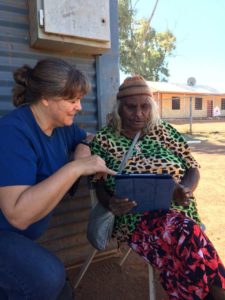
We have also been fortunate to receive a seeding grant to develop an in-language screening app for Pitjantjatjara people. This is now in the trial phase with our team travelling out to Ceduna and Port Augusta, as well as meeting up with people living/visiting the Adelaide region. Just over 100 people have completed the app at this stage, and the results are already really interesting. This project comes to an end in June.
New digs
Ben and Kat have relocated to offices within The Flats complex (up the hill from FMC).
Selina, Bekh and I have relocated our office in Salisbury, and are very proud to announce the opening of the Flinders Wellbeing Centre. The Centre houses the North-western Aboriginal Gambling Service, the Aboriginal Gambling Therapy Service and other like-minded services. This shift has been a long time coming and we cannot thank Meredith and Sharon enough for all their support in making this move a reality.
Sue Bertossa
Research Fellow/Psychotherapist
What’s new in Education and Training?
Accredited Trainer Forum 2017
Thursday 16th November (and in related time zones in Hong Kong and the USA) marked the delivery of another successful Flinders Program Accredited Trainer Forum. The combined efforts of the Education and Training team, other FHBHRU staff and Flinders University’s IT staff were instrumental in supporting delivery to both in-house and online participants.
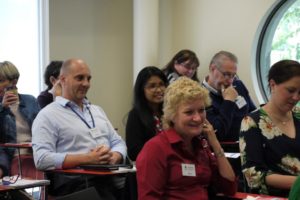
The sense of community and partnerships that have been a key part of the Flinders Program success for many years across diverse settings and practitioners was clearly evident on the day and much appreciated by participants. Accredited Trainers can access more information, the presentations and additional photos from the day at the following link https://www.flindersprogram.com.au/trainers/forum-2017/
In 2017, we were proud to announce Cathie Miller as the worthy recipient of the 2017 Trainer of Excellence Markwick-Reece Award for her long-standing commitment to the Flinders Program in the Bendigo region and with her contribution to the success of the HARP program. In 2017, the Bendigo HARP program was used as case study evidence for the New York Commonwealth Fund to determine the leading international approaches to collaborative care for high needs, high costs populations. You can read more about the success of this program at https://dspace.flinders.edu.au/xmlui/handle/2328/37507 “Managing chronic conditions care across primary care and hospital systems: lessons from an Australian Hospital Avoidance Risk Program using the Flinders Chronic Condition Management Program”.
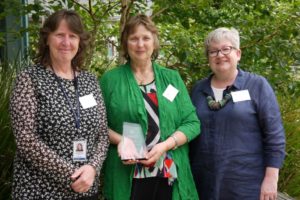
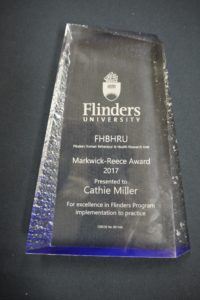
Motivational Interviewing sessions for SA Health
In 2018, we look forward to again delivering repeat sessions of a two-part series focussed on practical skills in Motivational Interviewing (MI) for allied health professionals. The 2018 sessions will be predominantly delivered face-to-face; however, we are collaborating with SA Health and Country Health SA (CHSA) in further developing MI content and activities suitable for delivery via videoconferencing.
From March-June 2017, the FHBHRU team delivered these sessions to over 110 SA Health staff and from July-November we delivered MI sessions to another 40+ participants in Berri, Mt Gambier and Whyalla.
Flinders Closing the Gap Program collaboration with CHSALHN – Mental Health Services
We continue to work with Kathy Verran and the team from CHSALHN – Mental Health Services to develop and support their statewide pool of Flinders Program Accredited Trainers. This has been a long-standing partnership and we appreciate the ongoing commitment to implementation of the Flinders Program within CHSALHN – Mental Health Services.
WA Country Health Service
In mid-2017, we entered into an exciting partnership with WA Country Health Service (WACHS). The Primary Health and Engagement department is sponsoring key clinical staff from regional areas to undertake post-graduate qualifications in Chronic Condition Management (CCM) through Flinders University. This collaborative commitment to supporting regional based clinicians to undertake CCM studies is a significant milestone in improving consistency in workforce capacity and capability in self-management support. It also signifies a system-wide commitment to build sustainability of the CCM workforce across WACHS services. Additionally, we are also working together to support the integration of the Flinders Program care planning tools within their local IT systems.
WACHS is sponsoring a two-day Flinders Program Accredited Trainer workshop in Perth to be delivered on 30th & 31st May, 2018. This workshop is generally only offered in Adelaide.
Limited places available (priority will be given to WACHS personnel)
In the first instance, please contact Carole Rainsford, Project Leader Chronic Conditions (Clinical) to discuss registering for this workshop.
P (08) 63831839 Mobile: 0408657175 Email: carole.rainsford@health.wa.gov.au
New Staff!
It is with great pleasure that we welcome two new staff members to the Education and Training Team!
Susan Tappin will be joining us from 16th April and is already well known to many in the unit as a Flinders Program Accredited Trainer, she comes to the team from a Nursing role in rural SA.
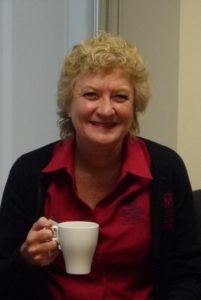
Katy Ricketts is also joining our team from 26th April and joins us from an Occupational Therapy role at SALHN. Photo to follow in next issue……
We look forward to having both on staff and continuing to grow our short course programs, both face-to-face and online.
News flash!
We are currently developing an app of the PIH Scale! The development will include both text and graphic versions of the 12 questions so watch this space!

Andrea Morello
Health Services Manager, Flinders Program Education and Training
Lecturer in Chronic Condition Management
What type of Research is happening at FHBHRU?
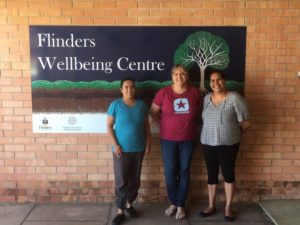
Physical and Mental Health
We have numerous ongoing research projects / tenders / new grant applications in the areas of Cognitive Behaviour Therapy (CBT), Smoking Cessation, Veteran / Emergency Service First Responders (ESFRs), Indigenous Health, and Gambling.
Examples of this research include:
- Research that focuses on smoking cessation in disadvantaged populations and incorporates the use of digital technology continues, as does research into the application of the Flinders Program to improve cardiovascular health (NHMRC funded) and investigate improving mental health in veteran and ESFR populations.
- Building on the Low Intensity (LI) CBT materials developed in 2017, several pilot studies are now taking place to determine the acceptability, effectiveness, and economic benefits of these materials in the Flinders Medical Centre Pain Unit (FMCPU) and the Child and Adolescent Family Health Service (CaFHS).
- Collaboration with the Flinders Wellbeing Centre (Salisbury, South Australia) is underway with two Masters of CBT students conducting projects to determine the effectiveness of the “Be Active Live Well” program and adapt the LICBT workbooks for use with indigenous Australians.
- A partnership with the School of Education has developed and submitted an Australian Research Council (ARC) Discovery Grant to investigate whether LICBT can be used to develop a level of awareness and resilience in teachers to reduce occupational stress.
- Finally, over 27 student research projects underway which focus on aspects of an individual’s physical and/or mental health. These projects range from investigating the effectiveness of a trauma focused CBT program, to examining how elements of the Flinders Program are actually incorporated into a health professional’s daily work.
Chronic Disease
Research and training continues in the areas of service and family research, the Flinders Program, and Motivational Interviewing (MI).
Examples of this research include:
- Research into the national and international application and effectiveness of the Flinders Program (e.g., United States of America, Mexico, Hong Kong, and China).
- Research on the translation of the Partners in Health Scale into a Chinese, French, Swedish, and with a Cancer Survivor population, along with its evaluation in an indigenous population.
- Finally, numerous student research projects are underway that examine the effectiveness and acceptability of MI training (refer to ‘What’s new in Education and Training section’), and the development of an online avatar to train health professionals in MI.
While the above provides only a snapshot of the extensive product development, training, and research currently undertaken at FHBHRU, it does provide an indication of the variety and practical ‘user focus’ orientation we maintain.
If you have any questions about what is described above, or other research enquiries, please contact me and I’ll put you in touch with the relevant researchers within FHBHRU.
Dr Anthony Venning
Lecturer (Scholarly Fellow) / Research Manager
Cognitive Behaviour Therapy Postgraduate Programs
Upcoming Workshops 2018
May 30-31 Flinders Accredited Trainer Program (WACHS Perth)
August 8 Behavioural Activation
August 13-16 CBT for Psychological Disorders
August 20-21 Flinders Chronic Condition Management (CCM) Program
August 23-24 Building Resiliance with Young People
October 3 How to Use Motivational Interviewing Skills in Everyday Practice
October 10-11 Flinders Accredited Trainer Program
For further information on the workshops please visit http://www.flinders.edu.au/medicine/sites/fhbhru/education/study.cfm
Chronic Condition Management (CCM) Postgraduate Programs
Chronic Condition Management has become relevant to all practice and service settings. The course topics cater to both individual areas of interest and/or your role in health care, along with providing learning in a diverse range of chronic conditions and their management, rather than being targeted to specific conditions.
We offer:
- Graduate Certificate in Chronic Condition Management
- Graduate Diploma in Chronic Condition Management
- Master of Public Health (Chronic Conditions Management Stream)
For further information on the programs please visit http://www.flinders.edu.au/medicine/sites/fhbhru/education/pg_ccm.cfm
Are you interested in becoming a volunteer?
Do you have an ongoing health condition? Such as Diabetes, Arthritis, Asthma, Auto-immune Disease, Heart Disease, Lung Disease, Parkinson’s, Cystic Fibrosis, Cancer, Pain or loss of mobility?
Do you have two hours to spare?
As a volunteer at one of our workshops, you will be interviewed by Flinders University student/s or health professional/s who works with people with ongoing health conditions.
Volunteers often give feedback about how they have enjoyed this experience and have often learnt something new about their health. For the workshop participants, working with the volunteer is a highlight of their training.
Refreshments will be provided.
Please contact the CCM team at Flinders University ccm@flinders.edu.au

